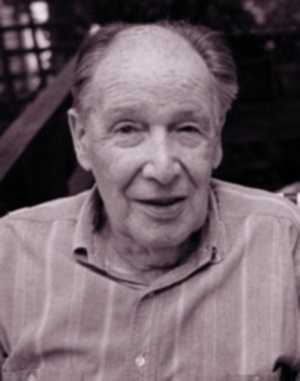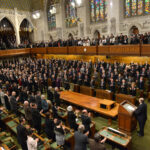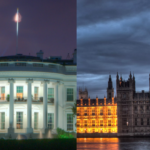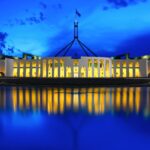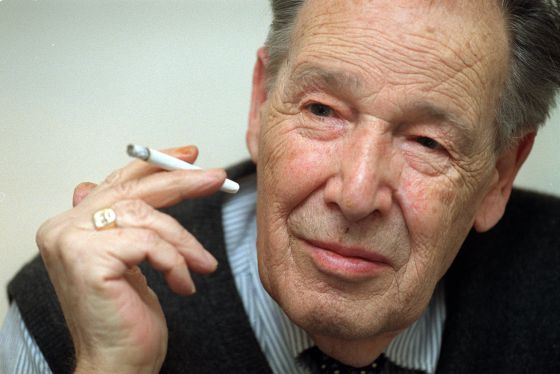
by the late Dr. Juan J. Linz
As more of the world’s nations turn to democracy, interest in alternative constitutional forms and arrangements has expanded well beyond academic circles. In countries as dissimilar as Chile, South Korea, Brazil, Turkey, and Argentina, policymakers and constitutional experts have vigorously debated the relative merits of different types of democratic regimes. Some countries, like Sri Lanka, have switched from parliamentary to presidential constitutions. On the other hand. Latin Americans in particular have found themselves greatly impressed by the successful transition from authoritarianism to democracy that occurred in the 1970s in Spain, a transition to which the parliamentary form of government chosen by that country greatly contributed.
Nor is the Spanish case the only one in which parliamentarism has given evidence of its worth. Indeed, the vast majority of the stable democracies in the world today are parliamentary regimes, where executive power is generated by legislative majorities and depends on such majorities for survival.
(Note: Finland has since ceased to be a hybrid “semi-presidential” system and is now a full-parliamentary system)
The burden of this essay is that the superior historical performance of parliamentary democracies is no accident. A careful comparison of parliamentarism as such with presidentialism as such leads to the conclusion that, on balance, the former is more conducive to stable democracy than the latter. This conclusion applies especially to nations with deep political cleavages and numerous political parties; for such countries, parliamentarism generally offers a better hope of preserving democracy.
Parliamentary vs. Presidential Systems
A parliamentary regime in the strict sense is one in which the only democratically legitimate institution is parliament; in such a regime, the government’s authority is completely dependent upon parliamentary confidence. Although the growing personalization of party leadership in some parliamentary regimes has made prime ministers seem more and more like presidents, it remains true that barring dissolution of parliament and a call for new elections, premiers cannot appeal directly to the people over the heads of their representatives. Parliamentary systems may include presidents who are elected by direct popular vote, but they usually lack the ability to compete seriously for power with the prime minister.
In presidential systems, an executive with considerable constitutional powers – generally including full control of the composition of the cabinet and administration – is directly elected by the people for a fixed term and is independent of parliamentary votes of confidence. He is not only the holder of executive power but also the symbolic head of state and can be removed between elections only by the drastic step of impeachment. In practice, as the history of the United States shows. presidential systems may be more or less dependent on the cooperation of the legislature; the balance between executive and legislative power in such systems can thus vary considerably.
But what is most striking is that in a presidential system, the legislators, especially when they represent cohesive, disciplined parties that offer clear ideological and political alternatives, can also claim democratic legitimacy. This claim is thrown into high relief when a majority of the legislature represents a political option opposed to the one the president represents. Under such circumstances, who has the stronger claim to speak on behalf of the people: the president or the legislative majority that opposes his policies? Since both derive their power from the votes of the people in a free competition among well-defined alternatives, a conflict is always possible and at times may erupt dramatically. Theme is no democratic principle on the basis of which it can be resolved, and the mechanisms the constitution might provide are likely to prove too complicated and aridly legalistic to be of much force in the eyes of the electorate. It is therefore no accident that in some such situations in the past, the armed forces were often tempted to intervene as a mediating power. One might argue that the United States has successfully rendered such conflicts “normal” and thus defused them. To explain how American political institutions and practices have achieved this result would exceed the scope of this essay, but it is worth noting that the uniquely diffuse character of American political parties—which, ironically, exasperates many American political scientists and leads them to call for responsible, ideologically disciplined parties—has something to do with it. Unfortunately, the American case seems to be an exception; the development of modern political parties, particularly in socially and ideologically polarized countries, generally exacerbates, rather than moderates, conflicts between the legislative and the executive.
Paradoxes of Presidentialism
Presidential constitutions paradoxically incorporate contradictory principles and assumptions. On the one hand, such systems set out to create a strong, stable executive with enough plebiscitarian legitimation to stand fast against the array of particular interests represented in the legislature. In the Rousseauan conception of democracy implied by the idea of ‘the people,” for whom the president is supposed to speak, these interests lack legitimacy: so does the Anglo-American notion that democracy naturally involves a jostle—or even sometimes a melee—of interests. Interest group conflict then bids fair to manifest itself in areas other than the strictly political. On the other hand, presidential constitutions also reflect profound suspicion of the personalization of power: memories and fears of kings and caudillos do not dissipate easily. Foremost among the constitutional bulwarks against potentially arbitrary power is the prohibition on reelection. Other provisions like legislative advice-and-consent powers over presidential appointments, impeachment mechanisms, judicial independence, and institutions such as the ContralorIía of Chile also reflect this suspicion. Indeed. political intervention by the armed forces acting as a poder moderador may even be seen in certain political cultures as a useful check on overweening executives. One could explore in depth the contradictions between the constitutional texts and political practices of Latin American presidential regimes; any student of the region’s history could cite many examples.
Perhaps the best way to summarize the basic differences between presidential and parliamentary systems is to say that while parliamentarism imparts flexibility to the political process, presidentialism makes it rather rigid. Proponents of presidentialism might reply that this rigidity is an advantage, for it guards against the uncertainty and instability so characteristic of parliamentary politics. Under parliamentary government, after all, myriad actors—parties, their leaders, even rank- and-file legislators—may at any time between elections adopt basic changes, cause realignments, and, above all, make or break prime ministers. But while the need for authority and predictability would seem to favor presidentialism, there are unexpected developments—ranging from the death of the incumbent to serious errors in judgment committed under the pressure of unruly circumstances—that make presidential rule less predictable and often weaker than that of a prime minister. The latter can always seek to shore up his legitimacy and authority, either through a vote of confidence or the dissolution of parliament and the ensuing new elections. Moreover, a prime minister can be changed without necessarily creating a regime crisis.
Considerations of this sort loom especially large during periods of regime transition and consolidation, when the rigidities of a presidential constitution must seem inauspicious indeed compared to the prospect of adaptability that parliamentarism offers.
Zero-sum Elections
The preceding discussion has focused principally on the institutional dimensions of the problem; the consideration of constitutional provisions—some written, some unwritten—has dominated the analysis. In addition, however, one must attend to the ways in which political competition is structured in systems of direct presidential elections; the styles of leadership in such systems; the relations between the president, the political elites, and society at large; and the ways in which power is exercised and conflicts are resolved. It is a fair assumption that institutional arrangements both directly and indirectly shape the entire political process, or “way of ruling.’ Once we have described the directly, and for a predictable span rather than leaving that decision to the backstage maneuvering of the politicians. But this advantage can only differences between parliamentary and presidential forms of government be present if a clear mandate results. If there is no required minimum that result from their differing institutional arrangements, we shall be ready to ask which of the two forms offers the best prospect for creating, consolidating, and maintaining democracy.
Absent the support of an absolute and cohesive majority, a parliamentary system inevitably includes elements that become institutionalized in what has been called “consociational democracy.” Presidential regimes may incorporate consociational elements as well, perhaps as part of the unwritten constitution. When democracy was reestablished under adverse circumstances in Venezuela and Colombia, for example, the written constitutions may have called for presidential government, but the leaders of the major parties quickly turned to consociational agreements to soften the harsh, winner-take-all implications of presidential elections.
The danger that zero-sum presidential elections pose is compounded by the rigidity of the president’s fixed term in office. Winners and losers are sharply defined for the entire period of the presidential mandate. There is no hope for shifts in alliances, expansion of the government’s base of support through national-unity or emergency grand coalitions, new elections in response to major new events, and so on. Instead, the losers must wait at least four or five years without any access to executive power and patronage. The zero-sum game in presidential regimes raises the stakes of presidential elections and inevitably exacerbates their attendant tension and polarization.
On the other hand, presidential elections do offer the indisputable advantage of allowing the people to choose their chief executive openly, between the victor and the runner-up may be too thin to support any claim that a decisive plebiscite has taken place. To preclude this. electoral laws sometimes place a lower limit on the size of the winning plurality or create some mechanism for choosing among the candidates if none attains the minimum number of votes needed to win; such procedures need not necessarily award the office to the candidate with the most votes. More common are run-off provisions that set tip a confrontation between the two major candidates, with possibilities for polarization that have already been mentioned. One of the possible consequences of two-candidate races in multiparty systems is that broad coalitions are likely to be formed (whether in run-offs or in preelection maneuvering) in which extremist parties gain undue influence. If significant numbers of voters identify strongly with such parties. one or more of them can plausibly claim to represent the decisive electoral bloc in a close contest and may make demands accordingly. Unless a strong candidate of the center rallies widespread support against the extremes, a presidential election can fragment and polarize the electorate.
A two-round election can avoid some of these problems, for the preliminary round shows the extremist parties the limits of their strength and allows the two major candidates to reckon just which alliances they must make to win. This reduces the degree of uncertainty and promotes more rational decisions on the part of both voters and candidates. In effect, the presidential system may thus reproduce something like the negotiations that ‘form a government” in parliamentary regimes. But the potential for polarization remains, as does the difficulty of isolating extremist factions that a significant portion of the voters and elites intensely dislike.
The Spanish Example
For illustration of the foregoing analysis, consider the case of Spain in 1977, the year of the first free election after the death of Francisco Franco. The parliamentary elections held that year allowed transitional prime minister Adolfo Suarez to remain in office. His moderate Union del Centro Democrático (UCD) emerged as the leading party with 34.9 percent of the vote and 167 seats in the 350-seat legislature. The Socialist Party (PSOE), led by Felipe Gonzalez, obtained 29.4 percent and 118 seats, followed by the Communist Party (PCE) with 9.3 percent and 20 seats, and the rightist Alianza Popular (AP), led by Manuel Fraga, with 8.4 percent and 16 seats.
These results clearly show that if instead of parliamentary elections, a presidential contest had been held, no party would have had more than a plurality. Candidates would have been forced to form coalitions to have a chance of winning in a first or second round. Prior to the election, however, there was no real record of the distribution of the electorate’s preferences. In this uncertain atmosphere, forming coalitions would have proven difficult. Certainly the front-runners would have found themselves forced to build unnecessarily large winning coalitions.
Assuming that the democratic opposition to Franca would have united behind a single candidate like Felipe Gonzáles (something that was far from certain at the time), and given both the expectations about the strength of the Communists and the ten percent of the electorate they actually represented, he would never have been able to run as independently as he did in his campaign for a seat in parliament. A popular-front mentality would have dominated the campaign and probably submerged the distinct identities that the different parties, from the extremists on the left to the Christian Democrats and the moderate regional parties in the center, were able to maintain in most districts. The problem would have been even more acute for the center-rightists who had supported reforms, especially the reforma pactada that effectively put an end to the authoritarian regime. It is by no means certain that Adolfo Suarez, despite the great popularity he gained during the transition process, could or would have united all those to the right of the Socialist Party. At that juncture many Christian Democrats, including those who would later run on the UCD ticket in 1979, would not have been willing to abandon the political allies they had made during the years of opposition to Franco: on the other hand, it would have been difficult for Suárez to appear with the support of the rightist AP, since it appeared to represent the “continuist” (i.e., Francoist) alternative. For its part. the AP would probably not have supported a candidate like Suárez who favored legalization of the Communist Party.
The Style of Presidential Politics
Since we have thus far focused mostly’ on the implications of presidentialism for the electoral process, one might reasonably observe that while the election is one thing, the victor’s term in office is another: once he has won, can he not set himself to healing the wounds inflicted during the campaign and restoring the unity of the nation? Can he not offer to his defeated opponents—but not to the extremist elements of his own coalition—a role in his administration and thus make himself president of all the people? Such policies are of course possible, but must depend on the personality and political style of the new president and, to a lesser extent, his major antagonists. Before the election no one can be sure that the new incumbent will make conciliatory moves; certainly the process of political mobilization in a plebiscitarian campaign is not conducive to such a turn of events. The new’ president must consider whether gestures designed to conciliate his recent opponents might weaken him unduly, especially if he risks provoking his more extreme allies into abandoning him completely. There is also the possibility that the opposition could refuse to reciprocate his magnanimity, thus causing the whole strategy to backfire. The public rejection of an olive branch publicly proffered could harden positions on both sides and lead to more. rather than less. antagonism and polarization.
Some of presidentialism’s most notable effects on the style of politics result from the characteristics of the presidential office itself. Among these characteristics are not only the great powers associated with the presidency but also the limits imposed on it—particularly those requiring cooperation with the legislative branch, a requirement that becomes especially salient when that branch is dominated by opponents of the president’s party. Above all, however, there are the time constraints that a fixed term or number of possible terms imposes on the incumbent. The office of president is by nature two-dimensional and. in a sense, ambiguous: on the one hand, the president is the head of state and the representative of the entire nation; on the other hand, he stands for a clearly partisan political option. If he stands at the head of a multiparty coalition, he may even represent an option within an option as he deals with other members of the winning electoral alliance.
Perhaps the most important consequences of the direct relationship that exists between a president and the electorate are the sense the president may have of being the only’ elected representative of the whole people and the accompanying risk that he will tend to conflate his supporters with ‘the people” as a whole. The plebiscitarian component implicit in the president’s authority’ is likely to make the obstacles and opposition he encounters seem particularly annoying. In his frustration he may be tempted to define his policies as reflections of the popular will and those of his opponents as the selfish designs of narrow interests. This identification of leader with people fosters a certain populism that may be a source of strength. It may’ also, however, bring on a refusal to acknowledge the limits of the mandate that even a majority to say nothing of a mere plurality—can claim as democratic justification for the enactment of its agenda. The doleful potential for displays of cold indifference, disrespect, or even downright hostility toward the opposition is not to be scanted.
The absence in presidential regimes of a monarch or a “president of the republic” who can act symbolically as a moderating power deprives the system of flexibility and of a means of restraining power. A generally neutral figure can provide moral ballast in a crisis or act as a moderator between the premier and his opponents—who may include not only his parliamentary’ foes but military leaders as well. A parliamentary regime has a speaker or presiding member of parliament who can exert some restraining influence over the parliamentary antagonists, including the prime minister himself, who is after all a member of the chamber over which the speaker presides.
The Problem of Dual Legitimacy
Given his unavoidable institutional situation, a president bids fair to become the focus for whatever exaggerated expectations his supporters may harbor. They are prone to think that he has more power than he really has or should have and may sometimes be politically mobilized against any adversaries who bar his way. The interaction between a popular president and the crowd acclaiming him can generate fear among his opponents and a tense political climate. Something similar might be said about a president with a military background or close military ties—which are facilitated by the absence of the prominent defense minister one usually finds under cabinet government.
Ministers in parliamentary systems are situated quite differently from cabinet officers in presidential regimes. Especially in cases of coalition or minority governments, prime ministers are much closer to being on an equal footing with their fellow ministers than presidents will ever be with their cabinet appointees. (One must note, however, that there are certain trends which may lead to institutions like that of Kanzlerdemokratie in Germany, under which the premier is free to choose his cabinet without parliamentary approval of the individual ministers. Parliamentary systems with tightly disciplined parties and a prime minister who enjoys an absolute majority of legislative seats will tend to grow quite similar to presidential regimes. The tendency to personalize power in modern politics, thanks especially to the influence of television, has attenuated not only the independence of ministers but the degree of collegiality and collective responsibility in cabinet governments as well.)
One need not delve into all the complexities of the relations between the executive and the legislature in various presidential regimes to see that all such systems are based on dual democratic legitimacy: no democratic principle exists to resolve disputes between the executive and the legislature about which of the two actually represents the will of the people. In practice, particularly in those developing countries where there are great regional inequalities in modernization, it is likely that the political and social outlook of the legislature will differ from that held by the president and his supporters. The territorial principle of representation, often reinforced by malapportionment or federal institutions like a non-proportional upper legislative chamber, tends to give greater legislative weight to small towns and rural areas. Circumstances like these can give the president grounds to question the democratic credentials of his legislative opponents. He may even charge that they represent nothing but local oligarchies and narrow, selfish clienteles. This may or may not be true, and it may or may not be worse to cast one’s ballot under the tutelage of local notables, tribal chieftains, landowners, priests, or even bosses than under that of trade unions, neighborhood associations, or party machines. Whatever the case may be, modern urban elites will remain inclined to skepticism about the democratic bona fides of legislators from rural or provincial districts. In such a context, a president frustrated by legislative recalcitrance will be tempted to mobilize the people against the putative oligarchs and special interests, to claim for himself alone true democratic legitimacy as the tribune of the people, and to urge on his supporters in mass demonstrations against the apposition. It is also conceivable that in some countries the president might represent the more traditional or provincial electorates and could use their support against the mare urban and modern sectors of society,
The Issue of Stability
Among the oft-cited advantages of presidentialism is its provision for the stability of the executive. This feature is said to furnish a welcome contrast to the tenuousness of many parliamentary governments, with their frequent cabinet crises and changes of prime minister, especially in the multiparty democracies of Western Europe. Certainly the spectacle of political instability presented by the Third and Fourth French Republics and, more recently, by Italy and Portugal has contributed to the low esteem in which many scholars—especially in Latin America—hold parliamentarism and their consequent preference for presidential government. But such invidious comparisons overlook the large degree of stability that actually characterizes parliamentary governments. The superficial volatility they sometimes exhibit obscures the continuity of parties in power, the enduring character of coalitions, and the way that party leaders and key ministers have of weathering cabinet crises without relinquishing their posts. In addition, the instability of presidential cabinets has been ignored by students of governmental stability. It is also insufficiently noted that parliamentary systems, precisely by virtue of their surface instability, often avoid deeper crises. A prime minister who becomes embroiled in scandal or loses the allegiance of his party or majority coalition and whose continuance in office might provoke grave turmoil can be much more easily removed than a corrupt or highly unpopular president. Unless partisan alignments make the formation of a democratically legitimate cabinet impossible, parliament should eventually be able to select a new prime minister who can form a new government. In some more serious cases, new elections may be called, although they often do not resolve the problem and can even, as in the case of Weimar Germany in the 1930s, compound it.
The government crises and ministerial changes of parliamentary regimes are of course excluded by the fixed term a president enjoys. but this great stability is bought at the price of similarly great rigidity. Flexibility in the face of constantly changing situations is not presidentiatism’s strong suit. Replacing a president who has lost the confidence of his party or the people is an extremely difficult proposition. Even when polarization has intensified to the point of violence and illegality, a stubborn incumbent may remain in office. By the time the cumbersome mechanisms provided to dislodge him in favor of a more able and conciliatory successor have done their work, it may be too late. Impeachment is a very uncertain and time-consuming process, especially compared with the simple parliamentary vote of no confidence. An embattled president can use his powers in such a way that his opponents might not be willing to wait until the end of his term to oust him, but there are no constitutional ways—save impeachment or resignation under pressure—to replace him. There are, moreover, risks attached even to these entirely legal methods; the incumbent’s supporters may feel cheated by them and rally behind him. thus exacerbating the crisis. It is hard to imagine how the issue could be resolved purely by’ the political leaders. with no recourse or threat of recourse to the people or to nondemocratic institutions like the courts or—in the worst case—the military. The intense antagonisms underlying such crises cannot remain even partially concealed in the corridors and cloakrooms of the legislature. What in a parliamentary system would be a government crisis can become a full-blown regime crisis in a presidential system.
Today, of course, few constitutions would allow something like the United States’ Jefferson-Burr election of 1800 to occur. Instead they require that presidential and vice-presidential candidates be nominated together, and forbid ticket-splitting in presidential balloting. But these formal measures can do nothing to control the criteria far nomination, There are undoubtedly’ cases where the vice-president has been nominated mainly to balance the ticket and therefore represents a discontinuity’ with the president. Instances where a weak vice-presidential candidate is deliberately picked by an incumbent jealous of his awn power, or even where the incumbent chooses his own wife, are not unknown. Nothing political leaders would have selected the vice-president to wield the powers they were willing to give to the former president. The continuity that the institution of automatic vice-presidential succession seems to ensure thus might prove more apparent than real. There remains the obvious possibility’ of a caretaker government that can fill in until new elections take place, preferably as soon as possible. Yet it hardly seems likely that the severe crisis which might have required the succession should also provide an auspicious moment for a new presidential election.
(Note by Admin: The Philippines is one such country whose current 1987 Constitution provided for separately-elected President and Vice-President which has caused ticket-splits to occur most of the time, leading to massive instability)
The Time Factor
Democracy is by definition a government pro tempore, a regime in which the electorate at regular intervals can hold its governors accountable and impose a change. The limited time that is allowed to elapse between elections is probably the greatest guarantee against overweening power and the last hope for those in the minority. Its drawback, however, is that it constrains a government’s ability to make good on the promises it made in order to get elected. If these promises were far-reaching, including major programs of social change, the majority may feel cheated of their realization by the limited term in office imposed on their chosen leader. On the other hand, the power of a president is at once so concentrated and so extensive that it seems unsafe not to check it by limiting the number of times any one president can be reelected. Such provisions can be frustrating, especially if the incumbent is highly ambitious; attempts to change the rule in the name of continuity have often appeared attractive,
Even if a president entertains no inordinate ambitions, his awareness of the time limits facing him and the program to which his name is tied cannot help but affect his political style. Anxiety about policy discontinuities and the character of possible successors encourages what Albert Hirschman has called “the wish of vouloir conclure.” This exaggerated sense of urgency on the part of the president may lead to ill-conceived policy initiatives, overly hasty stabs at implementation, unwarranted anger at the lawful opposition, and a host of other evils. A president who is desperate to build his Brasilia or implement his program of nationalization or land reform before he becomes ineligible for reelection is likely to spend money unwisely or risk polarizing the country for the sake of seeing his agenda become reality. A prime minister who can expect his party or governing coalition to win the next round of elections is relatively free from such pressures. Prime ministers have stayed in office over the course of several legislatures without rousing any fears of nascent dictatorship, for the possibility of changing the government without recourse to unconstitutional means always remained open.
The fixed term in office and the limit on reelection are institutions of unquestionable value in presidential constitutions but they mean that the political system must produce a capable and popular leader every four years or so, and also that whatever “political capital” the outgoing president may have accumulated cannot endure beyond the end of his term.
The inevitable succession also creates a distinctive kind of tension between the ex-president and his successor. The new man may feel driven to assert his independence and distinguish himself from his predecessor, even though both might belong to the same party. The old president, for his part. having known the unique honor and sense of power that come with the office, will always find it hard to reconcile himself to being out of power for good, with no prospect of returning even if the new incumbent fails miserably. Parties and coalitions may publicly split because of such antagonisms and frustrations. They can also lead to intrigues, as when a still-prominent former president works behind the scenes to influence the next succession or to undercut the incumbent’s policies or leadership of the party.
Of course similar problems can also emerge in parliamentary systems when a prominent leader finds himself out of office but eager to return.
But parliamentary regimes can more easily mitigate such difficulties for a number of reasons. The acute need to preserve party unity, the deference accorded prominent party figures, and the new premier’s keen awareness that he needs the help of his predecessor even if the latter does not sit an the government bench or the same side of the house—all these contribute to the maintenance of concord. Leaders of the same party may alternate as premiers; each knows that the other may’ be called upon to replace him at any time and that confrontations can be costly to both, so they share power. A similar logic applies to relations between leaders of competing parties or parliamentary coalitions.
The time constraints associated with presidentialism, combined with the zero sum character of presidential elections, are likely to render such contests more dramatic and divisive than parliamentary elections, The political realignments that in a parliamentary’ system may take place between elections and within the halls of the legislature must occur publicly during election campaigns in presidential systems. where they are a necessary part of the process of building a winning coalition. Under presidentialism time becomes an intensely important dimension of politics. The pace of politics is very different under a presidential, as opposed to a parliamentary constitution. When presidential balloting is at hand, deals must be made not only publicly but decisively for the winning side to renege on them before the next campaign would seem like a betrayal of the voters’ trust. Compromises, however necessary, that might appear unprincipled, opportunistic, or ideologically unsound are much harder to make when they are to be scrutinized by the voters in an upcoming election. A presidential regime leaves much less room for tacit consensus building, coalition-shifting and the making of compromises which, though prudent, are hard to defend in public.
Parliamentarism and Political Stability
This analysis of presidentialism’s unpromising implications for democracy is not meant to imply that no presidential democracy can be stable; on the contrary, the world’s most stable democracy – the United States of America – has a presidential constitution. Nevertheless, one cannot help tentatively concluding that in many other societies the odds that presidentialism will help preserve democracy are far less favorable.
While it is true that parliamentarism provides a more flexible and adaptable institutional context for the establishment and consolidation of democracy it does not follow that just any sort of parliamentary regime will do. Indeed, to complete the analysis one would need to reflect upon the best type of parliamentary constitution and its specific institutional features. Among these would be a prime-ministerial office combining power with responsibility, which would in turn require strong, well-disciplined political parties. Such features—there are of course many others we lack the space to discuss—would help foster responsible decision making and stable governments and would encourage genuine party competition without causing undue political fragmentation. In addition, every country has unique aspects that one must take into account—traditions of federalism, ethnic or cultural heterogeneity, and so on. Finally, it almost goes without saying that our analysis establishes only probabilities and tendencies, not determinisms. No one can guarantee that parliamentary systems will never experience grave crisis or even breakdown.
In the final analysis, all regimes, however wisely designed, must depend for their preservation upon the support of society at large—its major forces, groups, and institutions. They rely, therefore, on a public consensus which recognizes as legitimate authority only that power which is acquired through lawful and democratic means. They depend also on the ability of their leaders to govern, to inspire trust, to respect the limits of their power, and to reach an adequate degree of consensus. Although these qualities are most needed in a presidential system, it is precisely there that they are most difficult to achieve. Heavy reliance on the personal qualities of a political leader—on the virtue of a statesman, if you will—is a risky course, for one never knows if such a man can be found to fill the presidential office. But while no presidential constitution can guarantee a Washington, a Juárez, or a Lincoln, no parliamentary’ regime can guarantee an Adenauer or a Churchill either. Given such unavoidable uncertainty, the aim of this essay has been merely to help recover a debate on the role of alternative democratic institutions in building stable democratic polities.
* * *
*
The late Dr. Juan J. Linz, Sterling Professor of Political and Social Science at Yale University was widely known for his contributions to the study of authoritarianism and totalitarianism, political parties and elites, and democratic breakdowns and transitions to democracy. In 1987 he was awarded Spain’s Principe de Asturias ~ in the social sciences.

